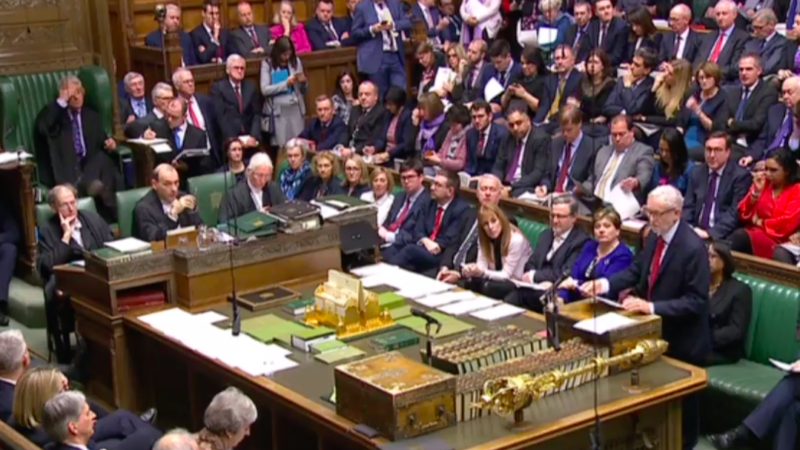
The House of Commons will get its second meaningful vote on Theresa May’s Brexit deal tonight – and there has been some changes. Or has there? That’ll be the talk of Westminster all day, as MPs debate whether the concessions secured by the Prime Minister last night allay enough concerns to overturn a 230-majority vote defeat. Currently, it looks like the ‘joint interpretative instrument’, ‘joint statement’ and ‘unilateral declaration’ by the UK won’t be sufficient – but a lot depends on the legal advice offered by attorney general Geoffrey Cox this morning and the conclusion reached by the DUP.
The Labour line is clear: we still won’t be voting for the deal. Jeremy Corbyn responded to the statement from Strasbourg saying: “The Prime Minister’s negotiations have failed. This evening’s agreement with the European Commission does not contain anything approaching the changes Theresa May promised parliament, and whipped her MPs to vote for.” And although the government contends that legally binding changes have been secured, Keir Starmer argued on BBC Radio 4 this morning that all the so-called changes can be found in previous documents. As the EU says, the additions are about ‘interpretation, clarification and elaboration’ – the backstop has not gone.
In terms of Labour rebels, it is difficult to spot much more than a handful of them. Three voted for the deal last time: Ian Austin, Kevin Barron and John Mann. With Austin having quit, that’s two from Labour. Then there’s the ‘inbetweeners’: Gareth Snell, Lisa Nandy, etc. They are very unlikely to be convinced – while looking for a reason to vote in favour, their demands have always related to the political declaration (not the backstop). Then the Brexit rebels on the left, such as Dennis Skinner and Laura Smith. Again, unlikely to have swayed because this doesn’t address their main concerns. Finally, the original Leavers, including Kate Hoey and Graham Stringer. Like many Tory Brexiteers, their view will likely be influenced by the DUP verdict and the ERG’s ‘star chamber’ of lawyers.
Whether MPs change their votes depends on the following: Are they looking for a political excuse to vote for the deal? How scared are they of the alternatives? For May, the second meaningful vote is about getting the defeat down to a manageable size. And the number against will probably go down – Nick Boles’ tweet thread will certainly help. But the EU says it won’t be offering any more than this, so if the backstop haters aren’t turned, the PM still faces a choice between no deal and a softer deal.
Sign up to LabourList’s morning email for everything Labour, every weekday morning.



More from LabourList
‘Labour is being badly misled on housing’
Reeves bets on patience over populism
‘Energy efficiency changes must work for older private renters’